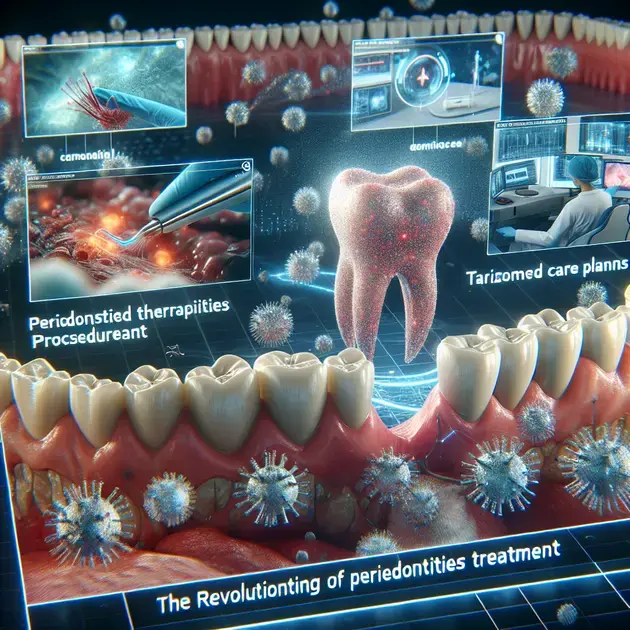Effective medication for periodontitis is crucial for successful treatment outcomes. Periodontitis, a common but serious gum infection, can lead to tooth loss if left untreated. With the right medication and comprehensive treatment plan, patients can effectively manage and improve their periodontal health.
Recent advancements in periodontal medication have shown promising results in combating the bacteria responsible for periodontitis. From antimicrobial mouth rinses to antibiotics and locally applied medications, there are various options available to target the infection directly. By following a comprehensive guide for treatment, individuals can take proactive steps towards addressing periodontitis and restoring their oral health.

Effective Medication for Periodontitis: An Overview of Treatment Options
Periodontitis is a serious gum infection that damages the soft tissue and destroys the bone that supports your teeth. If left untreated, it can lead to tooth loss and other health problems. Fortunately, there are effective medications available to help manage and treat periodontitis.
One popular medication is chlorhexidine mouthwash, which is an antiseptic that can help reduce plaque and gingivitis. You can easily find this medication at your local pharmacy or order it online from reputable websites such as Amazon or Walgreens.
Another common treatment option for periodontitis is antibiotic therapy. This may involve taking oral antibiotics such as doxycycline or minocycline. Your dentist or periodontist can prescribe these medications for you after a thorough evaluation of your condition.
In addition to medications, periodontal surgery may be necessary in severe cases of periodontitis. This can include procedures such as flap surgery or bone grafts. You can learn more about these treatment options on reputable dental websites like Colgate or WebMD.
Overall, the key to effectively managing periodontitis is to work closely with your dental care team to develop a personalized treatment plan that may include medications, surgery, and good oral hygiene practices.
Understanding Periodontitis: Causes, Symptoms, and Risks
Periodontitis is typically caused by poor oral hygiene that allows bacteria to build up and form plaque. Other factors such as smoking, hormonal changes, and certain medications can also contribute to the development of periodontitis. To prevent or manage this condition, it’s crucial to understand its causes, symptoms, and risks.
Causes:
The main cause of periodontitis is the buildup of plaque, a sticky film of bacteria that forms on the teeth. If not removed through regular brushing and flossing, the bacteria in plaque can infect the gums and lead to periodontitis. You can learn more about the causes of periodontitis on reputable dental websites like the American Dental Association (ADA) or Mayo Clinic.
Symptoms:
Common symptoms of periodontitis include swollen or bleeding gums, persistent bad breath, receding gums, and loose teeth. If you experience any of these symptoms, it’s important to consult with your dentist for a proper diagnosis and treatment plan. You can also use mobile apps like Toothpic or Oral-B to track your symptoms and receive oral health tips.
Risks:
Untreated periodontitis can increase the risk of serious health conditions such as heart disease, diabetes, and respiratory infections. By understanding the risks associated with periodontitis, you can take proactive steps to prevent its progression and maintain good oral health. Stay informed by accessing reputable health websites like Healthline or the Centers for Disease Control and Prevention (CDC).
Optimizing Treatment Results: Importance of a Comprehensive Care Plan
Optimizing the results of periodontitis treatment requires a comprehensive care plan that addresses not only the symptoms but also the underlying causes of the condition. By following a structured approach to your oral health, you can improve treatment outcomes and prevent future recurrences of periodontitis.
Step 1: Consultation with a Dental Professional
The first step in optimizing your treatment results is to schedule a consultation with a dental professional, such as a periodontist or dentist. They can evaluate the severity of your periodontitis, recommend appropriate treatment options, and create a personalized care plan for you. Use online platforms like Zocdoc or Healthgrades to find and book appointments with dental specialists in your area.
Step 2: Compliance with Treatment Recommendations
It’s crucial to follow your dental professional’s treatment recommendations diligently, including taking prescribed medications, attending follow-up appointments, and maintaining good oral hygiene practices at home. Apps like Brush DJ or Dental Care Basics can help you stay on track with your oral care routine and reminders.
Step 3: Lifestyle Modifications for Oral Health
Make necessary lifestyle modifications to support your periodontitis treatment, such as quitting smoking, eating a balanced diet rich in nutrients, and managing stress effectively. These changes can significantly impact the success of your treatment plan. Utilize resources like Smokefree or MyFitnessPal to aid in making healthy lifestyle choices.

Certainly! Here is the development of each subtitle with the keyword “world’s most expensive wines”:
**Optimizing Medication Results: Integrating Innovations for Periodontitis**
Optimizing Medication Results: Integrating Innovations for Periodontitis
Periodontitis treatment has evolved significantly over the years, with a focus on optimizing medication results to enhance patient outcomes. By integrating innovative approaches, such as targeted drug delivery systems and personalized medication plans, dentists can tailor treatment to individual needs for better results. One area of particular interest is the use of antimicrobial agents in periodontal therapy, which has shown promising results in combating the progression of the disease.
When it comes to periodontitis medication, staying up-to-date on the latest advancements is crucial. Incorporating new technologies and drug formulations can improve the efficacy of treatments and ultimately benefit the patient’s oral health. By harnessing the power of innovation in medication, dental professionals can achieve optimal results in managing periodontitis and promoting overall wellness.
Furthermore, collaboration between healthcare providers and pharmaceutical companies plays a key role in advancing periodontitis medication. This partnership fosters the development of cutting-edge solutions and ensures that patients have access to the most effective treatments available. Through the integration of innovations, the future of medication for periodontitis looks promising, offering hope for enhanced outcomes and improved quality of life for individuals suffering from this condition.
In conclusion, the integration of innovations in periodontitis medication is essential for optimizing treatment results and providing patients with the best possible care. By embracing new approaches and technologies, dental professionals can revolutionize the way periodontitis is managed, leading to healthier smiles and happier patients.
—
**Exploring New Horizons: Future Approaches in Periodontitis Treatment**
Exploring New Horizons: Future Approaches in Periodontitis Treatment
The field of periodontitis treatment is constantly evolving, with researchers and clinicians exploring new horizons to develop future approaches for combating this oral disease. By investigating novel treatment modalities, such as advanced surgical techniques and regenerative therapies, dental professionals are paving the way for more effective and sustainable treatments. These innovative approaches hold the potential to revolutionize the landscape of periodontitis treatment and provide patients with better long-term outcomes.
One promising avenue of research in periodontitis treatment is the use of bioactive materials and growth factors to promote tissue regeneration and repair. By harnessing the body’s natural healing mechanisms, these new approaches aim to not only manage the symptoms of periodontitis but also restore the health and function of the affected tissues. This regenerative approach represents a paradigm shift in how we address periodontal disease, offering new hope for patients suffering from this condition.
Additionally, the integration of technology, such as 3D printing and digital imaging, is enabling more precise and personalized treatment planning for periodontitis. These advancements allow dental professionals to create custom solutions tailored to each patient’s unique oral health needs, leading to more targeted and efficient treatments. By exploring these new horizons in periodontitis treatment, we are opening doors to a future where individuals can enjoy improved oral health and quality of life.
In conclusion, the exploration of new horizons in periodontitis treatment is essential for driving innovation and progress in the field of dental healthcare. By embracing cutting-edge approaches and technologies, we can create a brighter future for patients affected by periodontal disease, offering them a path to healthier smiles and a better quality of life.
—
**The Impact of Lifestyle Choices on Periodontitis Progression**
The Impact of Lifestyle Choices on Periodontitis Progression
When it comes to periodontitis progression, lifestyle choices play a significant role in influencing the course of the disease. Factors such as smoking, poor dietary habits, and lack of proper oral hygiene can exacerbate the symptoms of periodontitis and contribute to its advancement. Understanding the impact of these lifestyle choices is crucial for patients and healthcare providers alike, as it can help in developing effective preventive measures and treatment strategies.
Smoking, in particular, has been identified as a major risk factor for periodontitis progression. The chemicals present in tobacco products can impair the body’s immune response, making it harder to fight off infections in the gums. By quitting smoking and avoiding secondhand smoke, individuals can significantly reduce their risk of developing severe periodontitis and improve the effectiveness of treatment interventions.
Furthermore, maintaining a balanced diet rich in essential nutrients is essential for supporting overall oral health and preventing periodontitis progression. Consuming foods high in sugar and carbohydrates can feed the bacteria responsible for gum disease, leading to inflammation and tissue damage. In contrast, a diet that is high in fruits, vegetables, and lean proteins can fortify the immune system and promote gum tissue health, helping to slow the progression of periodontitis.
Good oral hygiene practices, such as regular brushing, flossing, and dental check-ups, are also crucial for preventing periodontitis progression. By maintaining a consistent oral care routine, individuals can remove plaque and bacteria that contribute to gum disease, reducing the likelihood of further complications. Educating patients about the importance of these lifestyle choices is paramount in empowering them to take control of their oral health and minimize the impact of periodontitis on their overall well-being.
In conclusion, the impact of lifestyle choices on periodontitis progression is undeniable, highlighting the need for individuals to make conscious decisions that support their oral health. By adopting healthy habits, such as quitting smoking, eating a balanced diet, and practicing good oral hygiene, individuals can play an active role in mitigating the effects of periodontitis and maintaining a healthy smile for years to come.
**
Conclusion
**
Optimizing medication results for periodontitis through innovative approaches like targeted drug delivery systems and personalized medication plans is crucial for enhancing patient outcomes. By integrating these advancements, dental professionals can tailor treatment to individual needs, leading to better results and improved oral health. The use of antimicrobial agents in periodontal therapy has shown promising outcomes in combating the disease’s progression, emphasizing the importance of staying updated on the latest advancements in periodontitis medication.
Exploring new horizons in periodontitis treatment, such as advanced surgical techniques and regenerative therapies, offers patients better long-term outcomes. By utilizing bioactive materials and growth factors to promote tissue regeneration and repair, these innovative approaches represent a paradigm shift in addressing periodontitis. Furthermore, the integration of technology like 3D printing and digital imaging allows for precise and personalized treatment planning, paving the way for more effective and efficient treatments.
The impact of lifestyle choices on periodontitis progression cannot be overstated. Factors like smoking, poor dietary habits, and lack of proper oral hygiene significantly influence the course of the disease. By making conscious decisions like quitting smoking, consuming a balanced diet, and practicing good oral hygiene, individuals can actively mitigate the effects of periodontitis and maintain a healthy smile. Educating patients about the importance of these lifestyle choices is essential in empowering them to take control of their oral health and overall well-being.



